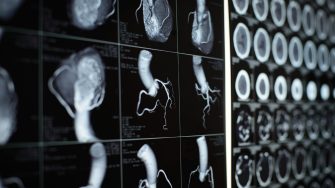
Cardiovascular and Metabolic Diseases in the School of Biomedical Sciences seeks a deeper understanding, early detection and prevention of cardiovascular disease as well as metabolic syndromes and diseases.
The Cardiovascular and Metabolic Disease Research Group is co-led by Prof. Kerry-Anne Rye and A/Prof. Shane Thomas. The research group consists of 4 post-doctoral scientists, 3 PhD students and 4 honours students. The group has two main research themes:
Heart disease
We are developing new anti-inflammatory therapies that prevent the development of atherosclerotic lesions, which can rupture and stop blood from getting to the heart, causing a heart attack. We are also asking whether these anti-inflammatory therapies can heal the tissue damage that is caused by a heart attack.
In particular, we are complexing a new class of nanoparticles with clinically viable peptides and small molecule drugs that inhibit inflammation and oxidative stress in the heart and blood vessels. We envisage that these new nanotherapeutics will reduce the risk of having a heart attack and stop tissue damage of a heart attack does occur. The research uses biochemical and molecular biology techniques as well as novel pre-clinical models of cardiovascular disease and crosses the disciplines of pharmacology and vascular biology.
We are also studying the molecular mechanisms by which vascular endothelial cells transform into pro-inflammatory mesenchymal-like cells via the process of endothelial-to-mesenchymal (EndMT). EndMT promotes the development of rupture-prone atherosclerotic lesions and we have identified new molecular signaling events driving this process that will inform the discovery of new treatments for inhibiting EndMT in cardiovascular disease. This project involves biochemistry, as well as cell and molecular biology.
Type 1 diabetes
Type 1 diabetes is an autoimmune disease in which insulin-producing cells in the pancreas are destroyed by activated T-cells and glucose can no longer be removed from blood. There is no cure for this disease, with the only treatment being regulation of blood glucose levels by multiple insulin injections every day. However, these injections can reduce blood glucose levels to an extent that is potentially lethal. Moreover, they treat the symptoms, not the underlying cause of the disease.
We have identified a peptide with the capacity to regenerate new insulin-producing cells in the pancreas and stop T-cell expansion, thus decreasing, and possibly removing, the dependence of patients with type 1 diabetes on insulin injections. Further development of this project towards clinical translation involves multiple skill sets including molecular biology, pharmacology. We are also developing strategies for oral peptide delivery, and using gold-standard pre-clinical models of type 1 diabetes.
